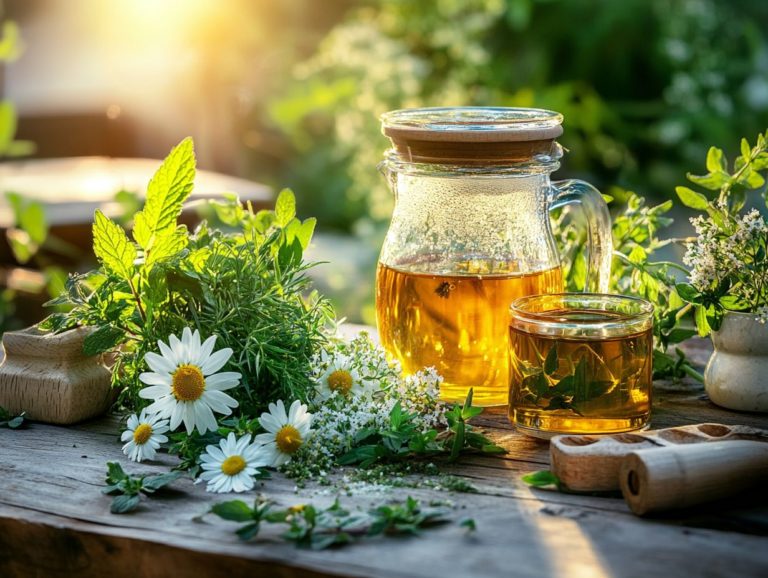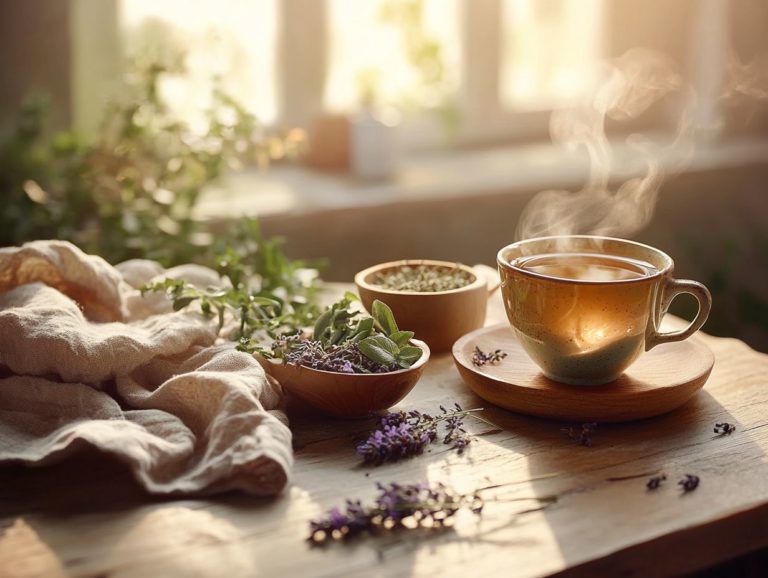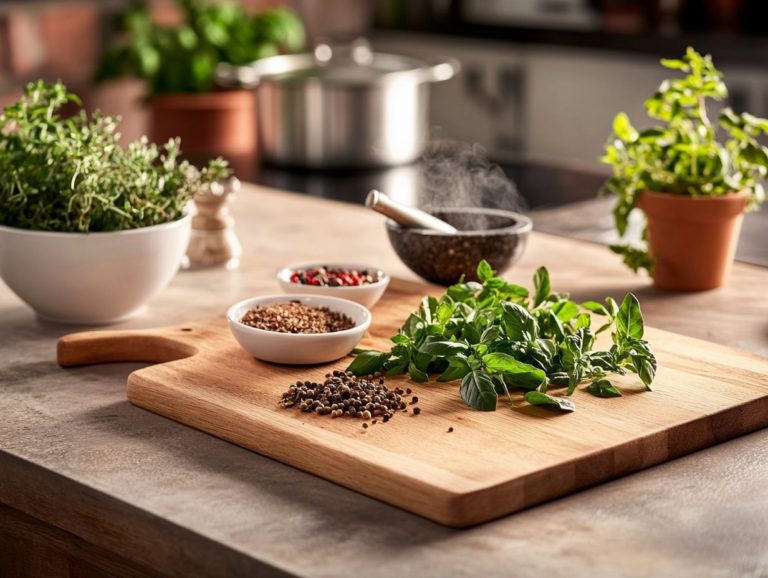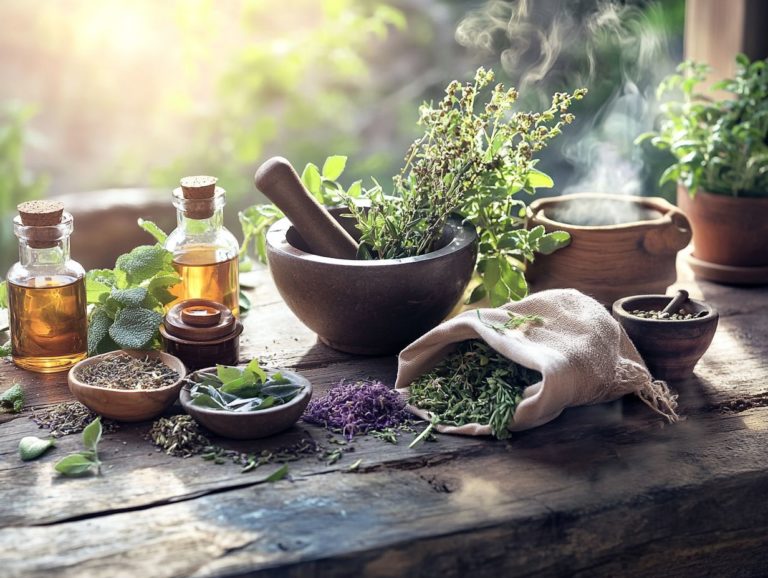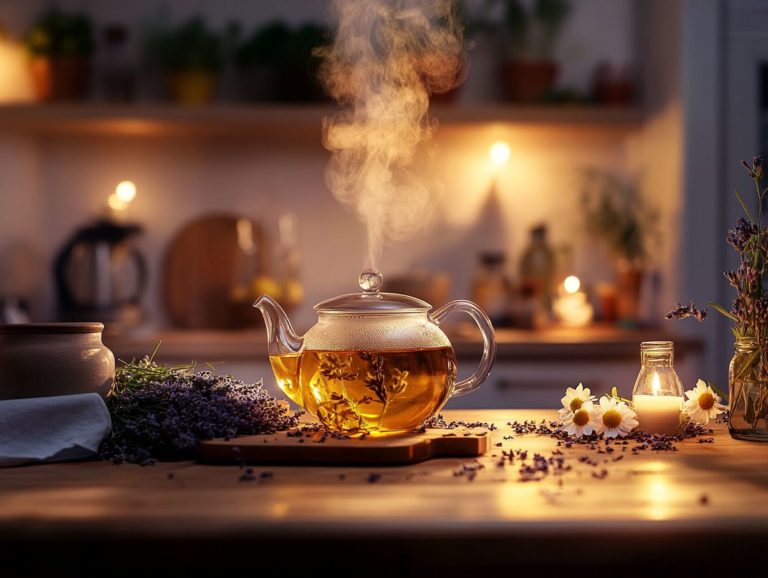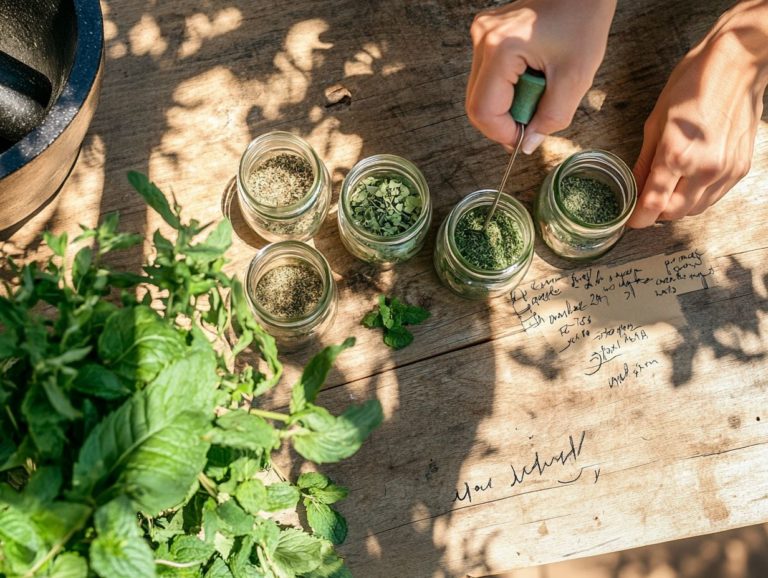Make Your Own Herbal Face Masks
Herbal face masks offer an exquisite opportunity to rejuvenate your skin with nature’s finest ingredients. These masks provide many benefits, from deep hydration to soothing inflammation, making them suitable for various skin types and concerns. This guide will assist you in selecting the perfect herbs, crafting your own masks, and seamlessly incorporating them into your skincare routine.
You ll also discover essential tips on safety and storage, along with answers to frequently asked questions. Get ready to unveil the secrets to radiant skin! Let’s embark on this journey together!
Contents
- Key Takeaways:
- 1. Benefits of Using Herbal Face Masks
- 2. Choosing the Right Herbs for Your Skin Type
- 3. Basic Ingredients for a Herbal Face Mask, Including Recipes
- 4. How to Make a Simple Herbal Face Mask
- 5. DIY Herbal Face Mask Recipes for Different Skin Types
- 6. Tips for Using and Storing Herbal Face Masks
- 7. Safety Precautions When Using Herbal Face Masks
- 8. Incorporating Herbal Face Masks into Your Skincare Routine: A Natural Approach
- 9. Other Uses for Herbal Face Masks
- 10. Frequently Asked Questions About Herbal Face Masks
- Can Herbal Face Masks Be Used for All Skin Types?
- Frequently Asked Questions
Key Takeaways:
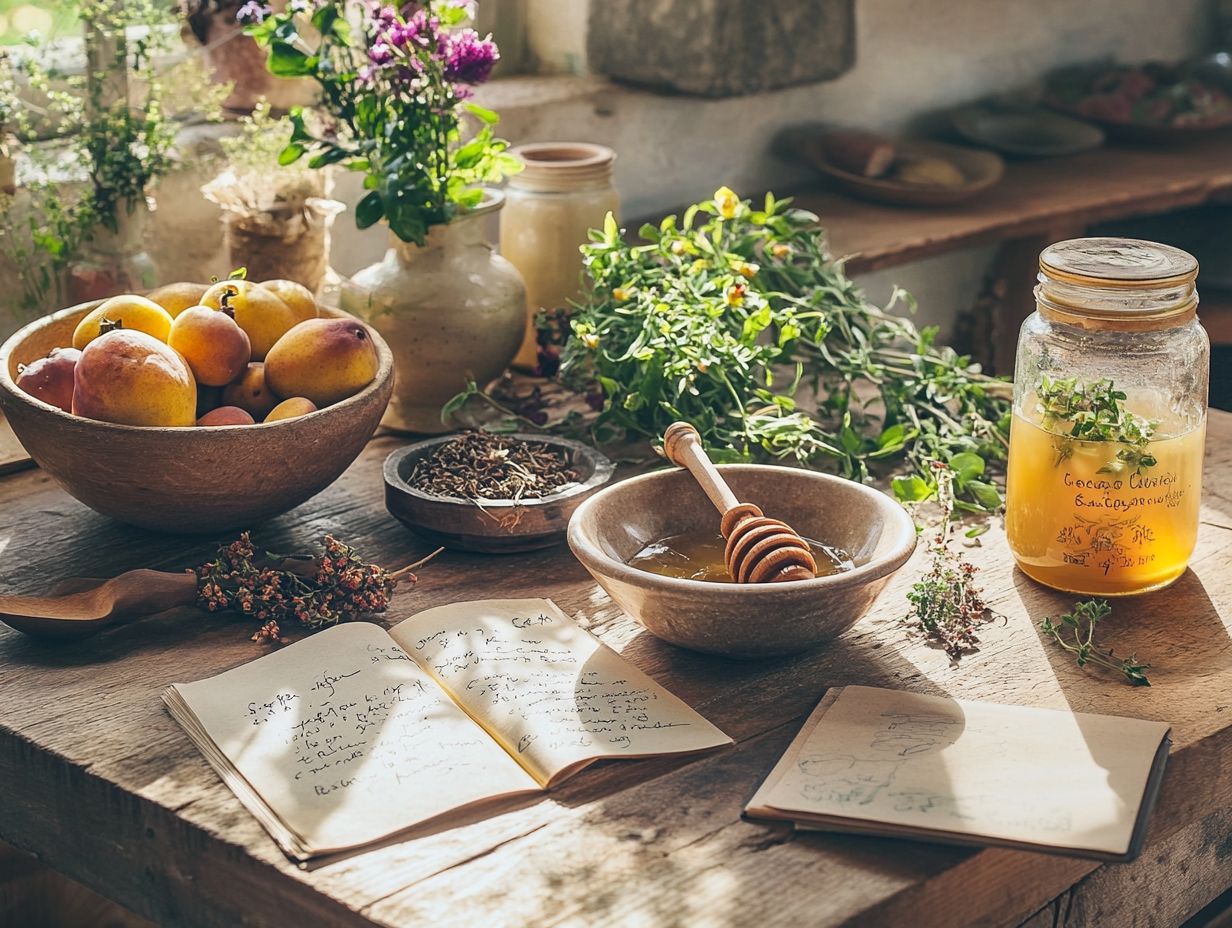
- Incorporate herbal face masks into your skincare routine for added benefits such as reducing inflammation and improving overall skin health.
- Choose the right herbs for your skin type to maximize the effectiveness of your DIY face masks.
- Use basic ingredients such as honey and oatmeal to create a simple yet effective herbal face mask that can be customized for your skin needs.
1. Benefits of Using Herbal Face Masks
Herbal face masks offer an array of benefits for your skin, including deep moisturizing, soothing irritated areas, and providing anti-inflammatory properties that can help alleviate various skin concerns. These natural skincare treatments harness the power of organic ingredients like nettle leaf, calendula flowers, and rhassoul clay, ensuring your skin receives the nourishment it craves.
With brightening effects and detoxifying properties, the diverse range of herbal masks available is tailored to meet different skin types and concerns, making them a vital addition to your beauty routine. For more information, check out this quick guide to creating herbal face cleansers.
For example, essential oils such as tea tree and lavender enhance the therapeutic qualities, specifically targeting acne-prone skin and promoting healing. Raw honey, celebrated for its humectant (a substance that helps retain moisture) properties, draws in moisture while functioning as a natural antiseptic ideal for dry or sensitive skin.
By incorporating these masks into your self-care regimen, you not only revitalize your complexion but also carve out a moment of tranquility, inviting yourself to pause and indulge in some pampering. Choosing the right ingredients customizes your mask for your skin needs, fostering a holistic sense of well-being.
2. Choosing the Right Herbs for Your Skin Type
Selecting the right herbs for your skin type is crucial in achieving the maximum benefits from your herbal face masks. Different herbs address specific skin concerns, whether you’re dealing with acne, dryness, or simply seeking overall moisture. By familiarizing yourself with herbal ingredients like calendula, nettle, and marshmallow root, you can significantly elevate your skincare routine.
For instance, if you have oily skin, you might find that herbs such as basil and lemon balm work wonders by absorbing excess oil and minimizing shine. Conversely, if dryness is your concern, the nourishing properties of chamomile and coconut oil can provide the hydration needed to restore moisture balance.
Those with sensitive skin will appreciate gentler solutions; herbs like lavender and oat extract are perfect for calming irritation and delivering a soothing touch. If you have combination skin, you can benefit from the balancing effects of green tea, which helps regulate oil production while offering essential hydration.
3. Basic Ingredients for a Herbal Face Mask, Including Recipes
Making a herbal face mask is all about choosing the right ingredients that nourish your skin and provide skin benefits. Consider raw honey for its antibacterial properties, rhassoul clay a natural clay known for its detoxifying properties and essential oils like lavender and geranium for their soothing effects.
These foundational elements ensure that your homemade mask is both effective and safe. To achieve the best results, it s vital to understand how these ingredients interact and the diverse effects they can produce.
For instance, combining raw honey with oatmeal provides gentle exfoliation and a hydration boost, perfect for those with dry or sensitive skin. Pairing rhassoul clay with aloe vera enhances detoxification while promoting healing, making it an excellent option for oily or acne-prone skin.
There’s a delightful array of recipes to explore, like a calming lavender mask that fuses essential oils with yogurt, or a revitalizing blend featuring green tea and mint for a refreshing lift. Additionally, you can learn how to make your own herbal deodorant to complement your skincare routine. Understanding these combinations helps you create tailored solutions that address your unique skin needs.
4. How to Make a Simple Herbal Face Mask
Crafting a simple herbal face mask at home can be a delightful DIY project that allows you to customize ingredients for your unique skin needs. Start by selecting your base perhaps rhassoul red clay or colloidal oatmeal and blend it with hydrating agents like raw honey and essential oils for a truly nourishing experience.
To create the perfect blend, measure each ingredient with precision using a kitchen scale or measuring spoons for accuracy. If you’re new to mixing, grab a small bowl and a whisk to ensure everything is well combined.
Once your mixture reaches a smooth, spreadable consistency, apply it evenly across your clean face using your fingertips or a soft brush, steering clear of sensitive areas like your eyes. Don’t skip the patch test; it’s essential for your skin’s safety! Feel free to experiment with different combinations of herbs, oils, and clays. You can even learn how to make your own herbal tea blends to complement your skincare routine. Discovering what works for your skin can be an exciting journey!
5. DIY Herbal Face Mask Recipes for Different Skin Types
Creating your own DIY herbal face mask recipes tailored to your skin type can elevate your skincare routine, providing targeted solutions for hydration, acne healing, and anti-aging. By incorporating organic ingredients like turmeric, hibiscus flower, and essential oils, you can craft effective masks that address your specific concerns.
This personalized approach fosters a deeper connection with the ingredients, enhancing your sense of self-care and overall wellness. For instance, if you have oily skin, a mask featuring clay and honey is particularly beneficial, as it absorbs excess oil while delivering essential moisture.
If your skin leans toward dryness, a blend of avocado and yogurt could provide the relief you need, with healthy fats and probiotics nourishing and rejuvenating your skin.
Those with sensitive skin can celebrate the soothing properties of gentle oatmeal and chamomile masks, helping to calm irritation and reduce redness. Ultimately, experimenting with these recipes allows you to fine-tune your routine based on your skin’s reactions, transforming skincare into an enjoyable and adaptable journey.
Try these recipes today and see the results for yourself!
6. Tips for Using and Storing Herbal Face Masks
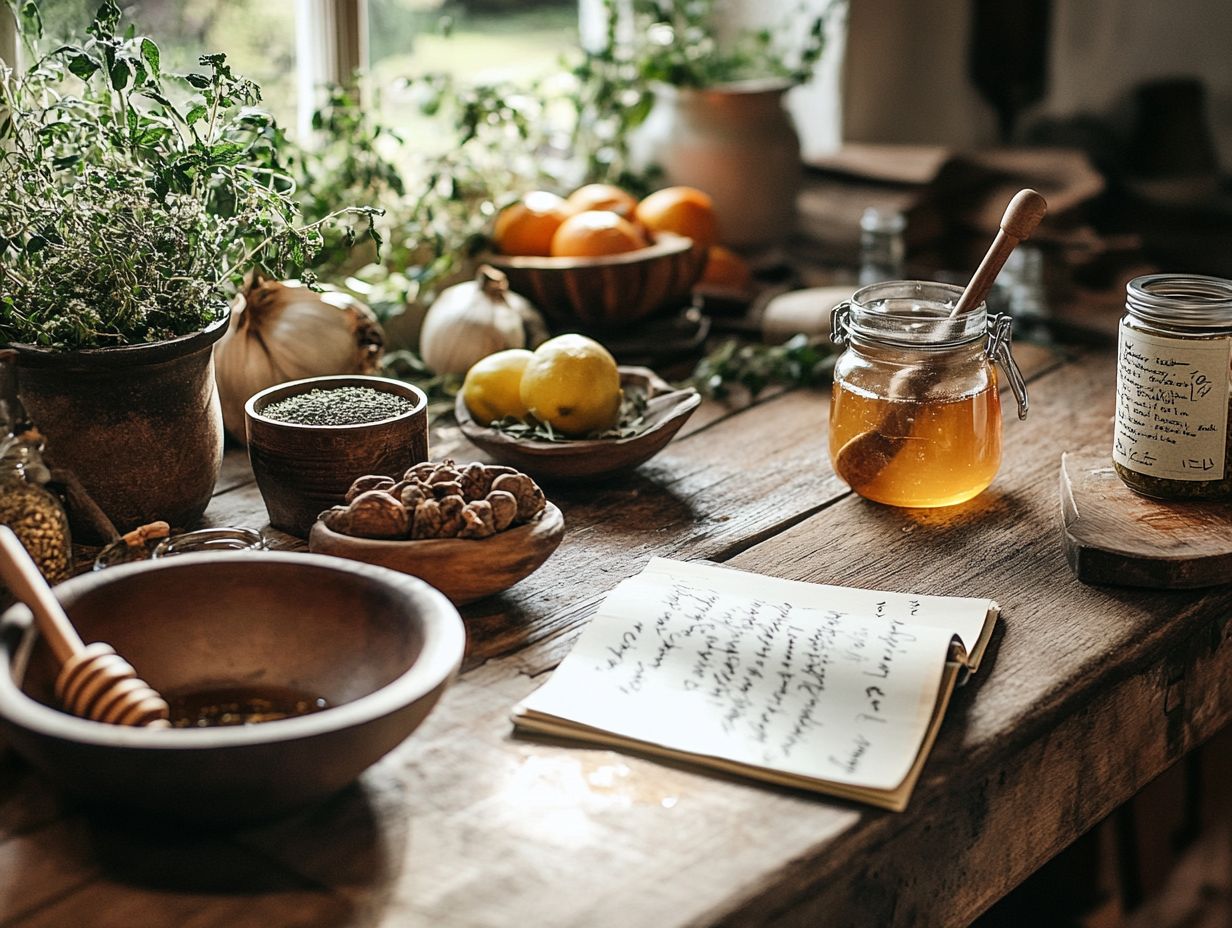
To maximize the benefits of your herbal face masks, adhere to best practices for usage and storage. This ensures freshness and effectiveness remain at the forefront of your skincare routine.
Pay close attention to storage methods, application frequency, and the shelf life of the ingredients to elevate your self-care experience.
Always cleanse your skin thoroughly to eliminate impurities and create a smooth canvas for optimal absorption. A gentle steam can work wonders, opening up your pores and allowing herbal properties to penetrate deeper.
When it s time to remove the mask, opt for warm water that feels comfortable on your skin, using gentle circular motions to ensure no residue lingers.
For homemade creations, store them in clean, airtight containers in a cool environment to extend their freshness.
Be vigilant for signs of spoilage and watch expiration dates. This attention to detail will help maintain the integrity and effectiveness of the natural ingredients you’re incorporating into your routine.
7. Safety Precautions When Using Herbal Face Masks
While herbal face masks offer many benefits, it s crucial to remain mindful of safety precautions to avoid unwanted reactions.
Always perform a patch test before trying new ingredients. Consider any known allergies or sensitivities you may have.
Stay alert for common side effects such as redness, itching, or a burning sensation, as these can signal an adverse reaction. If you have sensitive skin or are pregnant, exercise extra caution, as your skin may respond differently to certain herbal components.
Apply a small amount of the mask to a discreet area to assess your skin’s response over the course of 24 hours.
Be aware that ingredients like essential oils or specific botanical extracts can be potential triggers. Thoroughly read labels to identify any substances that might cause issues, ensuring your skincare journey remains safe and enjoyable.
8. Incorporating Herbal Face Masks into Your Skincare Routine: A Natural Approach
Incorporating herbal face masks into your routine can elevate your self-care regimen, providing essential nourishment while addressing various skin concerns.
Regular use of these masks enhances your skin’s health and offers a delightful moment of relaxation and pampering.
If you have dry skin, use herbal masks two to three times a week. For oily or acne-prone skin, applying them once or twice weekly may work wonders.
To boost the effects, complement these masks with moisturizers rich in natural oils or a natural substance that helps keep your skin hydrated.
Add serums that target specific needs like vitamin C for radiance or salicylic acid to tackle breakouts.
By integrating these products into your regular skincare regimen, you can embrace a holistic approach that nourishes, protects, and rejuvenates your skin.
9. Other Uses for Herbal Face Masks
Herbal face masks are incredibly versatile, providing benefits beyond just facial treatments. They cater to various beauty and skincare needs, whether soothing a sunburn or seeking an exfoliating boost.
For instance, applying a lavender-infused mask to your body can relieve tension and hydrate dry areas, creating a calming experience.
A nourishing aloe vera and honey mask works wonders on your hair, tackling dryness and adding shine.
Spot treatments are another fantastic option; a concentrated tea tree oil blend mixed with clay can effectively target blemishes, promoting clearer skin.
These examples showcase how you can seamlessly integrate herbal ingredients into your beauty routine, embracing an eco-friendly and holistic approach to personal care.
10. Frequently Asked Questions About Herbal Face Masks
The rising interest in herbal face masks has sparked a flurry of questions about their effectiveness, safety, and suitability for various skin types. This FAQ section is designed to provide you with clear answers to common inquiries about these natural beauty treatments.
As you explore alternatives to chemical-laden products, it becomes essential to understand how these plant-based mixtures can enhance your overall skin health. You might be wondering how often to apply herbal masks to achieve the results you desire without going overboard.
Concerns about the safety of specific ingredients like turmeric, aloe vera, or chamomile often come up, particularly for those with sensitive skin.
The question of which masks are suitable for different skin types whether oily, dry, or combination is a significant consideration. By looking into these topics, you can make informed choices about the best herbal masks to incorporate into your skincare routine.
Can Herbal Face Masks Be Used for All Skin Types?
Herbal face masks can be tailored for every skin type when you select the right ingredients, making them a versatile addition to your skincare routine. By understanding your specific skin type and targeting your unique concerns, you can safely enjoy the benefits of these natural treatments.
If you have oily skin, a mask with clay and tea tree oil could be your best friend, helping to absorb excess oil and reduce breakouts. Conversely, if your skin leans towards the dry side, seek out soothing ingredients like honey and oatmeal, which will provide moisture while calming irritation.
If you re dealing with sensitive skin, masks featuring chamomile and aloe vera can offer relief and balance, thanks to their anti-inflammatory properties.
By thoughtfully selecting these herbal components, you can achieve healthier, more radiant skin, no matter what challenges you face.
What Are the Benefits of Using Natural Ingredients in Face Masks?
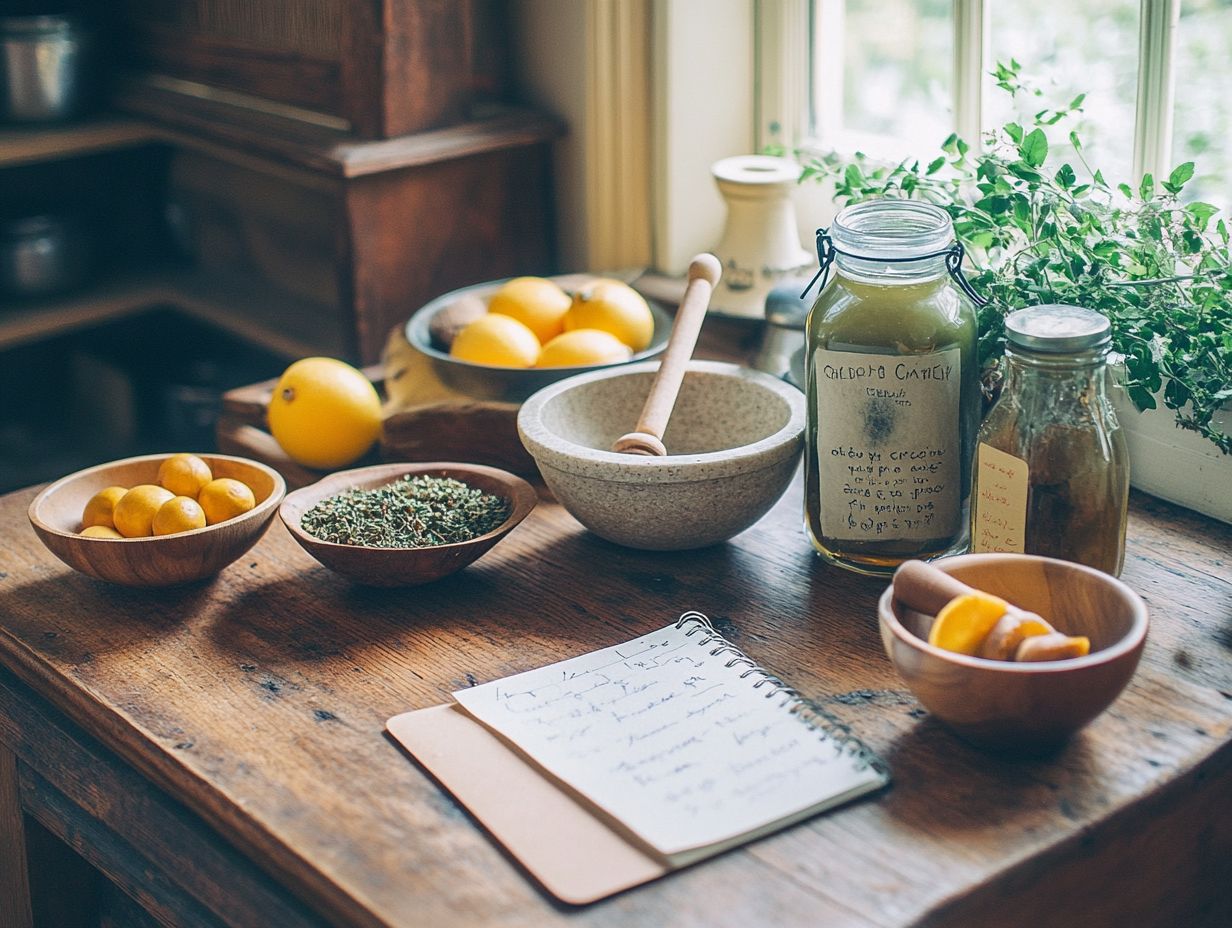
Using natural ingredients in face masks offers you a wealth of benefits, from enhanced skin nourishment and anti-inflammatory properties to a significantly reduced risk of adverse reactions compared to synthetic options. Herbal face masks emerge as an excellent choice for anyone seeking gentle yet effective skincare solutions.
These amazing masks tap into nature s power to give your skin a boost! For instance, ingredients like aloe vera provide remarkable hydration, transforming dry skin into a rejuvenated, supple canvas. Chamomile, on the other hand, brings soothing effects that calm irritation and redness, making it ideal for sensitive skin types.
Let s not forget tea tree oil, which serves as a natural antiseptic, effectively targeting acne without the harshness of chemical treatments. With their ability to enhance skin texture and infuse essential vitamins, it s no wonder that so many are gravitating toward these natural remedies for a radiant, healthy complexion.
How Often Should You Use a Herbal Face Mask?
The frequency of using herbal face masks should be tailored to your individual skin type and concerns. Generally, using them once or twice a week is ideal for most people. Sticking to this schedule lets you experience all the benefits of the masks without risking irritation.
If you have oily or acne-prone skin, look for masks with clay, which can absorb excess oil and help minimize breakouts. In this case, using them up to twice a week can be quite beneficial.
If your skin leans towards dryness or sensitivity, consider hydrating masks with soothing ingredients like aloe vera or honey. For you, applying a mask just once every two weeks might be more suitable.
Always be attentive to how your skin responds after each use. Should you notice any redness or irritation, scaling back and opting for gentler formulations can help maintain your skin s health. This way, you can ensure a personalized skincare routine that truly caters to your unique skin needs.
Don t wait to treat your skin! Start exploring these herbal face masks today!
What Are the Most Effective Herbs for Acne-Prone Skin?
For anyone grappling with acne-prone skin, specific herbs like turmeric, tea tree oil, and nettle stand out for their remarkable anti-inflammatory and antibacterial properties. By incorporating these herbs into your herbal face masks, you can effectively manage breakouts and work towards achieving clearer skin.
Turmeric in a mask tackles current acne outbreaks. It can also gradually reduce scarring due to its curcumin content.
A simple blend of turmeric with yogurt and honey creates a nourishing mask that soothes irritation beautifully.
Tea tree oil is well-known for its strong antibacterial effects. When mixed with clay, it works wonders in drawing out impurities and calming inflammation.
Nettle, packed with vitamins A and C, can be infused into a mask with oatmeal for gentle exfoliation and hydration. With regular use of these herbal masks, you may find a remarkable enhancement in your overall skin texture.
Are There Any Side Effects of Using Herbal Face Masks?
While herbal face masks are generally a safe choice, it’s wise to be aware of potential side effects, such as allergic reactions or skin irritation. This is especially true if the ingredients aren’t tailored to your specific skin type. Understanding these possibilities and performing patch tests before applying the mask is essential.
You should always be attentive to the components in your chosen formulations. Certain herbal ingredients, like specific essential oils or extracts, can provoke sensitivities in some individuals. Common side effects may include redness, itching, or breakouts.
Act fast! Always perform patch tests to ensure your skin stays happy and healthy! To minimize risks, start by testing a small area on your wrist or behind your ear to see how your skin reacts before applying the mask to your face. Being aware of ingredient profiles is crucial, particularly for those prone to allergies or have complex skin conditions. This ensures a safe and rewarding experience.
Can You Use Herbal Face Masks During Pregnancy?
Using herbal face masks during pregnancy can be perfectly safe, as long as you choose your ingredients wisely to steer clear of any harmful substances. It’s crucial for you to be well-informed about which natural ingredients are safe and beneficial for both you and your baby.
Selecting the right components can significantly enhance your skin health and promote relaxation both essential during this transformative time. As an expecting mother, it’s important to exercise caution by avoiding certain essential oils, such as rosemary or sage, which could pose risks.
Instead, you can indulge in soothing ingredients like oatmeal, aloe vera, or chamomile, all recognized for their gentle properties. Simple recipes, like an oatmeal and honey mask or a calming chamomile infusion, can nourish your skin without any adverse effects.
By prioritizing natural and safe ingredients, you ensure that both you and your baby can relish the benefits of skincare throughout your pregnancy.
Frequently Asked Questions
What are herbal face masks?
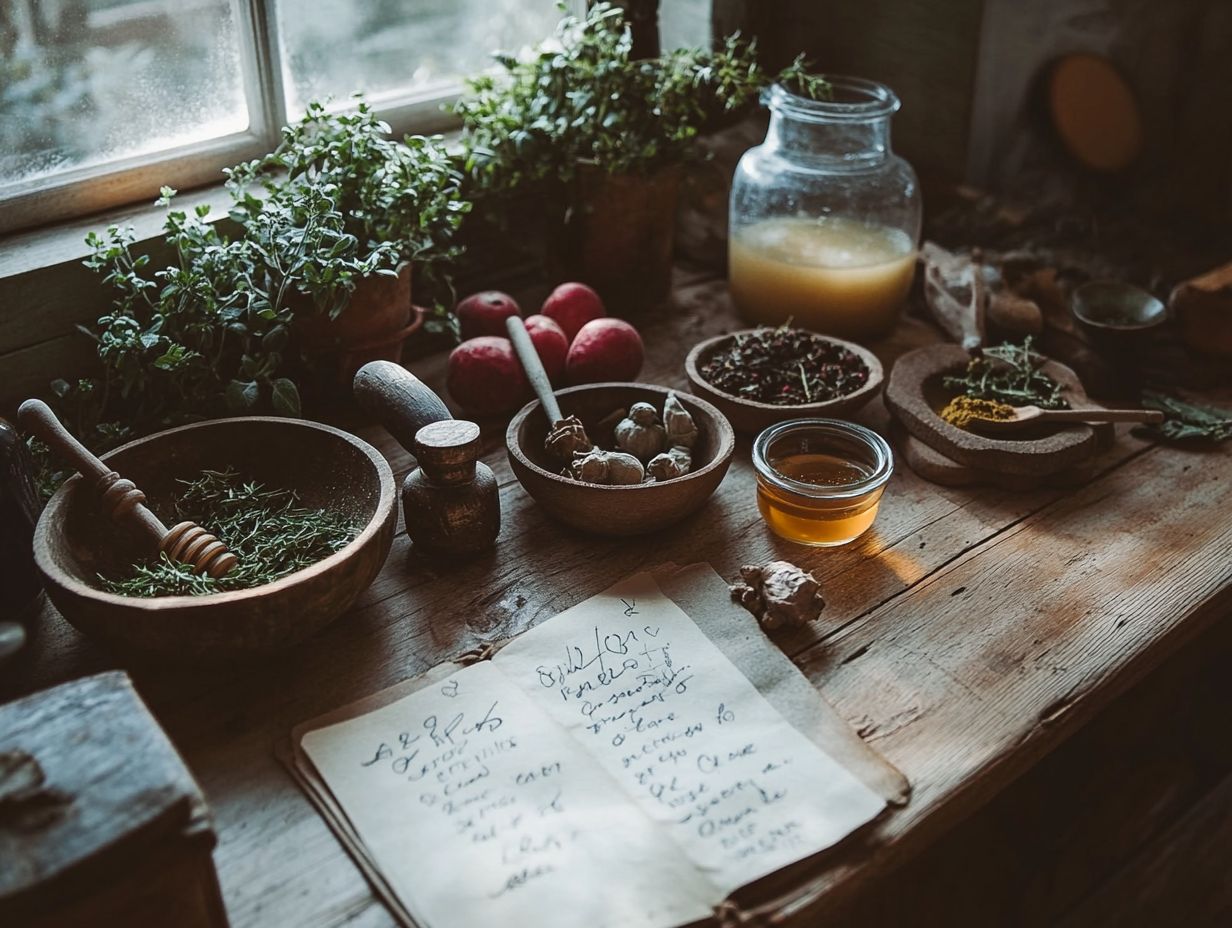
Herbal face masks are treatments made from natural ingredients like herbs, fruits, and vegetables. They help improve your skin’s overall health and appearance.
Why should I make my own herbal face masks?
By making your own DIY herbal face masks, you have complete control over the ingredients used. This ensures they are all-natural and free from harmful chemicals.
This allows you to customize the mask to meet your specific skin needs, catering to different skin types and concerns.
What are the benefits of using herbal face masks?
Herbal face masks offer numerous benefits, including nourishing and hydrating the skin, reducing inflammation and irritation, improving skin tone and texture, and promoting a healthy glow.
What herbs should I use in my face mask?
Some popular herbs used in face masks include chamomile, rosemary, lavender, green tea, and additional herbs like nettle leaf, calendula flowers, and hibiscus flower.
It is important to choose herbs that are suitable for your skin type and address your skin concerns.
How do I make my own herbal face mask at home?
Want to pamper yourself? Making a herbal face mask at home is simple and fun! Start by choosing your herbs.
Mix them with a base like yogurt, raw honey, or coconut oil. Then, apply the mixture to your face.
Leave it on for 10-15 minutes before rinsing off with warm water.
Are there any precautions I should take when using herbal face masks?
Some herbs can cause allergic reactions. Always patch test your mask on a small area of skin before applying it to your face.
Avoid any ingredients that you are allergic to or that may irritate your skin, like turmeric or activated charcoal.

